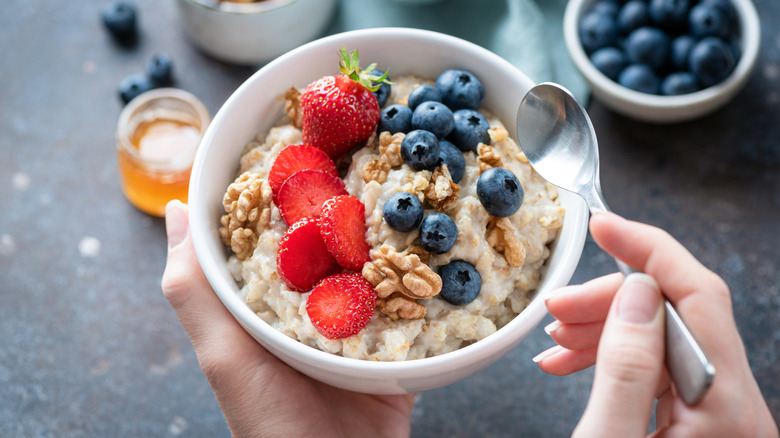When You Skip Breakfast, Here's What Happens To Your Blood Pressure
If you're following an intermittent fasting plan, more than likely you'll be used to skipping breakfast to ensure you're meeting your fasting window. The logic is that going for prolonged periods of not eating teaches your body to turn to fat stores for energy. People following other calorie-cutting plans might skip breakfast to shave their total calories for the day. You might also like to pass on that morning bagel because you're rushed to get to work in the morning.
Regardless of why you do it, skipping breakfast could be affecting your health. In a 2022 meta-analysis in the International Journal of Hypertension that combined the results of six studies with a total of 14,000 people, missing that morning meal could lead to a 20% increased risk of high blood pressure. Even after accounting for factors like weight, lifestyle, and diet, the connection between breakfast and blood pressure remained consistent. In other words, skipping breakfast might be setting the stage for trouble with your heart, no matter how healthy the rest of your day looks.
Theories why breakfast is linked to high blood pressure
Researchers have a few ideas as to why skipping breakfast is associated with a risk of high blood pressure. When you don't eat in the first hours after waking up, you could feel hungrier throughout the day, causing you to overeat. That could lead to gaining weight, which is a risk factor for high blood pressure. Breakfast skippers might also have unhealthy habits such as poor diet quality, inactivity, and sleep issues. Forgoing breakfast is also linked to inflammation, which could play a role in increasing blood pressure.
Starting your day without breakfast is also linked to higher death rates from heart disease, according to a 2019 study in the Journal of the American College of Cardiology. Researchers tracked more than 6,000 people between ages 40 and 75 for about 20 years and found that those who never ate breakfast had an 87% higher risk of dying from cardiovascular disease. Researchers believe longer fasting periods in the morning may stress your body, raising your blood pressure. Your blood pressure tends to be higher in the morning than during other times of the day. Skipping breakfast can also lead to higher LDL cholesterol levels, which can increase your risk of heart disease.
How to make your breakfast heart-healthy
Of course, you're not going to do much for your blood pressure or heart health if your breakfast is high in sodium, sugar, or saturated fat. A good breakfast should include a lean protein source (such as eggs or dairy), a serving of fruit or vegetable, and some type of whole grain. The fiber and protein can keep you full while the antioxidants from your fruit or vegetable can help protect your heart. To save time in the morning, try some low-fat Greek yogurt topped with fruit and nuts or top some peanut butter on a whole-grain waffle. Overnight oats are also a great option for a quick breakfast.
If you already have high blood pressure, the best time to eat breakfast is between 30 and 60 minutes after waking up. You'll help lower your cortisol levels, which tend to be higher in the morning. Breakfast will also help balance your cortisol levels later in the day to steady your blood pressure. A good breakfast for people with high blood pressure should include foods high in potassium and low in sodium such as bananas, yogurt, and avocados.


